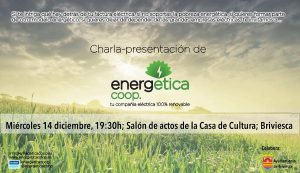Notes from the talk by volunteers of the Cooperativa de Energía EnergÉtica, a not-for-profit cooperative organization, in December 2017 in Briviesca, Burgos, Castilla, Spain

EnergÉtica sells electric energy. Formed by members who meet in assembly. They only buy renewable energy: sun, wind, bio-mass. The goal is not to have a profit. It does not even have salaried employees.
There are 550 members, all volunteers. To carry out the administration they receive help from another, larger company, another cooperative, SOM.
How the electrical system works in Spain.
For the electricity to travel from the point of production to your house, there are four phases that are carried out by different companies.
1. Production.
There are five big electricity producing companies in Spain, they are the big five: Endesa, Eon, EDP, Fenosa, Iberdrola. There are more than these five because it is a part of the process that is liberalized, but those are the big ones that hold almost the entire production market.
2. Transportation
There is only one company here. It is the “Red Eléctrica Española”, Spanish Electric Network. It owns the high voltage towers. 25% of this Network belongs to the State; the rest of it belongs to the four or five national companies.
3. Distribution.
From the sub-stations, which are usually close to big cities, to our meters. Only the big five are distributors, owners of the distribution infrastructure. These five do not own the nuclear plants, the dams; they exploit them but they do not own them. The Spaniards are the owners.
Of the whole of this stage of electricity, these five large ones only own the electricity meters.
5. Commercialisation.
The commercialisers manage the customers’ bills.
To manage the bills, there are six auctions every day where the electricity consumed in the whole of Spain is sold. Each commercialising company needs a person in charge of buying in this system of daily auctions. Each one buys the electricity that their customers need.
When liberalising (privatising) ‘the light’ (as electricity is often referred to in colloquial Spanish, since for many years light was the only thing electricity was needed for) only the production and the commercialisation were liberalised. The Spanish Electric Network only ensures that enough energy is purchased for the Spanish population and that subsidies are given to renewable energies.
The National Energy Commission is responsible for competition and sanctions for those who, for example, [plot to] agree on prices. The distributors charge in advance, and that is why they can not leave you without light when you change your dealer.
Components of the typical electricity bill.
Fixed costs: the power that has been contracted, whether it is used or not.
Consumption: what is consumed, which can predict time discrimination (paying less for the electricity consumed during the night)
Electricity Tax: 5.11% of all of the above – it is a fixed percentage that we all pay
Rental contract: 30 days x 0.02 €
VAT: 21% on all the above included on the electricity tax!
There are 22 trading companies in Spain. Energética.coop is one of them.
Energética.coop not only buys renewable energy, but also buys it as locally as possible. The big ones also sell renewable but with the typical scheme of the big multinationals, for which the profit is always more important than the consumer, and what is renewable, can be different for one of the big ones or for a cooperative (the criteria are different). Energética is local (Castilla y León), produced as locally as possible, for its members. They are with SOM because, being so few, they can not pay a salary for a person to buy in the daily auctions. It would need more than a thousand contracts to pay such a salary. SOM are about 27 thousand members.
In normal, non-cooperative companies, although they are small, they need people to consume more and therefore tend to make the fixed part of the bill more important, so that reducing consumption does not significantly affect the total amount. In EnergÉtica the fixed part is reduced to the minimum in such a way that the consumption is charged more -it is penalized. It is encouraged to consume less.
In a business venture this would be suicidal.
How to join EnergÉtica
In EnergÉtica you can become a member without being a customer. Each member may have or introduce two contracts.
To be a member you have to contribute 100€, and then you can become a customer and/or introduce some one else to become one.
The electricity companies know what they are going to earn as early as on the 1st of January each year. To guarantee that is what 50 of those those 100€ are needed for. The other 50 € are for administration expenses.
Before becoming a member of the EnergÉtica, depending on your circumstances, it is advisable to consult with the company with which we are now and/or with EnergÉtica. In fact anyone can consult the local volunteers. You can send them a bill or just their amounts and they can tell you if you would save money changing over, or not.
The volunteers meet in Valladolid to make decisions but the local group also meets in Burgos.
Twitter: @ energetica.coop
More contact details at energeticacoop.es